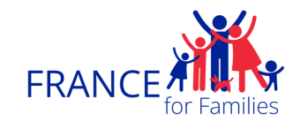If you are 45 years old or under you will probably have memories of learning French at school. You may even have GCSE French. And you may still wonder why the last time you spent time in France you found it hard make yourself understood, or understood what was being said to you. Learn French yourself, as a couple or as a family. Like most things in life, practice makes perfect, or even just good; and speaking French is no different. So what are your options to learn French (again!)?
Learn to speak French in France
There is no better way to learn to speak French than by being immersed in the language in France. Being totally surrounded by people speaking French, having to ask for things in French forces you to learn faster and hold it in your long-term memory. Specialist learn French courses in France are a great option, not only do you get expert tuition but you get to practice as soon as you step out of the class! There are a number of companies that offer these courses, a search on Google will help you find more details.
Online
Our favourite place to learn French is on Italki. The site brings together teachers from all over the world to teach you a language via the power of Skype or a similar service from the comfort of your own home. Sign up on the site for free and select a French teacher from the list, I would recommend selecting a native French speaker. Each 1 hour class you book will cost between £7 and £15 depending on the teacher’s prices.
Local classes
Every city and large town offers French classes, whether they are private or run by the local education authority, there will be a course starting near you. In addition, and something we’ve discovered recently, you can also join a French Meetup. Meetups are groups run by individuals for the benefit of the group members using the website meetup.com. Again you’ll find one or two groups in each large town or city. See http://www.meetup.com/ for more details.
What is the first thing you should learn?
We recommend working your way through these key areas:
1. Learning how to introduce yourself.
It is the first lesson in any French book, e.g. “Je m’appelle Will”.
2. Knowing a few different ways to say hello and goodbye.
The typical ‘Bonjour’ ‘Bonsoir’ and ‘Bonne Nuit’ (good day, good evening and goodnight) you have to say upon entering a place. Or the more generic and informal “Salut!”. Also to say goodbye: “Au revoir”, “À demain”, “À bientôt”, “À tout à l’heure”.
3. Learning the numbers in French.
This is key, not only in French, but in any language. The good news is that you only need to learn 1 to 10, and then 10, 20, 30, 40, 50, 60, 70, 80, 90 and 100. Practice, practice and practice! Practice pronouncing the numbers and practice listening to the numbers said to you.
4. Knowing the vowels and the alphabet.
It is essential to learn good phonics. In many classes these are often overlooked, but it is important, to know these sounds well “a”, “é”, “e”, “ai”, “eu”, “i”, “eau” “au”, “o”, “oi”, “ou”, “u”, “y”.
5. Handle Auxiliary verbs “être” (to be) and “avoir” (to have) well.
These are crucial, without knowing them you will be unable to say the most basic things in French. And are key in forming tenses, such as the passé composé.
6. Learn demonstrative adjectives.
The use of ‘ce’, ‘cet’ and ‘cette’ is very important to refer to things and constantly used.
7. Learn to conjugate popular verbs
It is highly advisable to learn to conjugate popular ER, RE and IR regular and irregular verbs. Such as ‘aller’, ‘prendre’, ‘choisir’, ‘entendre’, ‘rester’, ‘sortir’, ‘partir’ ‘manger’, ‘arriver’, ‘trouver’, ‘montrer and ‘retourner’.
8. Practice useful vocabulary.
It is best to learn by themes like, food, places (railway station, bus station, airport, etc), around the home, objects you carry around with you, parts of the body and many other themes. And not only learn the vocabulary but also learn the gender, either masculine or feminine.
9. Learning to ask questions and request information.
Learning to ask questions and seek information is another fundamental aspect. The use of pronouns like ‘Quoi’, ‘Qui’, ‘Où’, ‘Quand’, ‘Avez-vous’, ‘Comment’ and ‘Pourquoi’ are essential to form questions.
10. Knowing well the negative form “verbe + ne pas”.
It is really important to learn the negative form. The French language uses two words and the verb in the middle. For example, ‘Je ne sais pas’ (I don’t know).
What are you waiting for?!
Starting learn to speak French today and see a whole new world open up for you.
